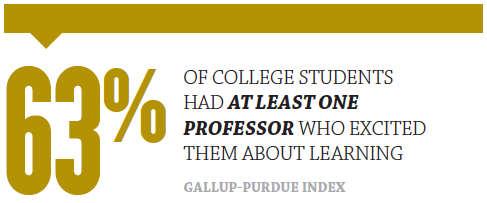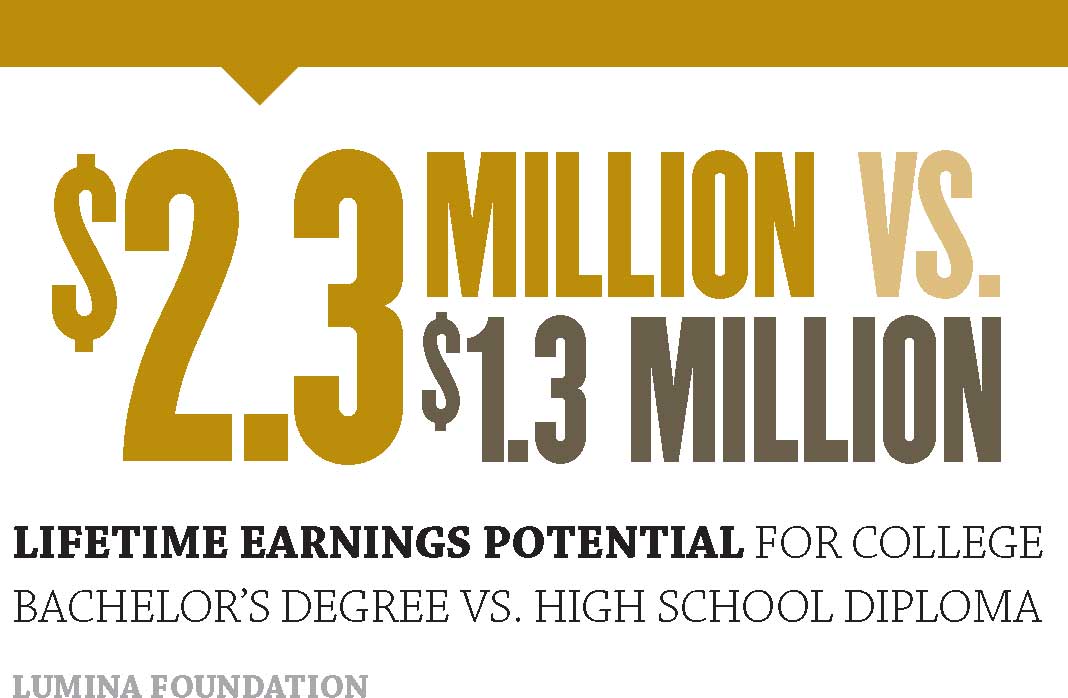The Gallup-Purdue Index (GPI), a recent survey of more than 30,000 U.S. college graduates, found that graduates who were emotionally supported during college, and who had participated in experiential and deep learning opportunities, were more likely to have high well-being and engagement with their jobs later in life. These graduates were more likely to have had a mentor during their undergraduate experience that encouraged them to pursue their goals and dreams. They also were extremely active in extracurricular activities. Importantly, they graduated with lower levels of student debt. Find the full report at www.gallup.com.
This guide is designed to help college students get the most out of the college experience. Review the list every semester and integrate the Gallup-Purdue Index findings into your college plan.
GET TO KNOW YOUR INSTRUCTORS
- Introduce yourself early in the semester.
- Ask questions. Go to class early or stay afterward to talk with the instructor.
- Go to office hours. Ask about material that you’re curious about, not only what you’re not sure you understand. Ask your instructor about her/his areas of interest and research.
- Ask your instructors about undergraduate research opportunities. You might invent a new product or make a scientific discovery.
- Arrange an independent study experience.
- By the middle of the semester, ask yourself:
- Do all of my instructors know who I am?
- Do I feel that my instructors care about me as a person?
- Have I developed a mentor/mentee relationship with one or more of my instructors?

GET INVOLVED, BECOME A LEADER
- Work part-time on campus. The GPI survey showed that if graduates had an internship or job where they applied what they were learning in the classroom, their odds of being engaged at work doubled. On-campus work also provides additional mentoring opportunities, allows you to practice skills that enhance your resumé and helps with college expenses.
- Co-curricular activities are a great way to explore your interests and meet new people. (WARNING: Don’t let your campus involvement, leadership positions, and volunteering get in the way of your academics!)
- Get involved in your residence hall, with people who share your major, or do something just for the fun of it.
- Volunteer. It’s a great way to do something for you while doing something important for someone else. You also can apply what you learn in class as you give back to the community.
- Consider an internship. Visit the Career Center to learn about options.
- Consider study abroad. Increase your world view. Many opportunities exist to visit other countries — from semester abroad programs to faculty-led spring break trips.
- Practice your leadership skills. Employers are looking for people who can lead from day one. College gives you many opportunities to build your skills so you can be ready when it’s time for a job.
Q&A
- Am I involved in activities that help me explore and express my interests?
- Am I in a leadership role or will there be an opportunity to grow into a leadership role?
- Am I using my time outside the classroom in a way that will help me after graduation?
GOOD STUDY SKILLS TO ENSURE ACADEMIC EXCELLENCE
Succeeding in the classroom isn’t necessarily hard, but it does take hard work. Here is the formula for success:
- Read the syllabus to find out when assignments are due, when tests are scheduled and how grades are determined.
- Go to every class. Never miss.
- Sit near the front in class. It will help you stay focused.
- Find a study partner or group in every class.
- Take good notes. After every class, rework/rewrite/reorganize your notes to increase your retention of the information. Start studying for every exam at least 7 days in advance. Don’t cram at the last minute — it usually doesn’t pay off.
- At the beginning of each semester, ask yourself:
- Do I understand what is expected of me in each class?
- Do I have contact information for someone in every class to study with or contact in case I’m sick?

- Manage your time wisely.
- Never let a week go by where you don’t understand the content in your courses.
- If you are confused or lost in a class, visit your professor, go to a help lab or study with a friend. Use your campus resources — they are there to help you.
Q&A
- Do I know what resources are available to me in general?
- Do I need any specific support or resources for a particular class?
SPEND AND INVEST WISELY
- Your financial aid office is a great resource not only for understanding your financial aid package, but also for financial literacy resources to help you make wise spending and borrowing decisions.
- Remember that if you are receiving need-based aid and/or taking out loans, you need to apply for financial aid EVERY year.
WELL-BEING
- Success means more than just good grades. Make sure you take care of your overall well-being with a complete approach to health and development.
- Utilize campus resources to support all of your needs — academic, social, emotional and financial.
- Make friends and share your collegiate experiences together. These friends become your support network and can be lifelong connections after college.
- Don’t forget to keep up with the right amounts of sleeping, eating and exercise.
GRADUATE IN 4 YEARS
- Time is money, both in college costs and delayed earning power.
- In most cases, students will need to successfully complete a minimum of 15 credits per semester in order to graduate in four years. The typical degree requires 120 credits, which is 15 credits over eight semesters.
- Work to identify the best major for you by the end of your first year — and once you have a plan, stick with it.
Q&A
- Do I have a well-designed degree plan that takes me through graduation in four years or less?

The College Board’s Paying for College website bigfuture.collegeboard.org/ pay-for-college provides great information, as does FinAid www.finaid.org/. The American Institute of Certified Public Accounts provides a terrific online money management resource 360financialliteracy.org/Life-Stages/College-Students.


